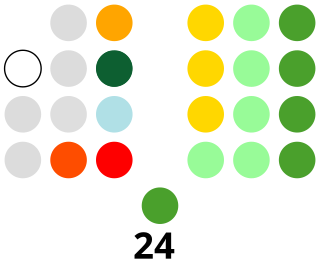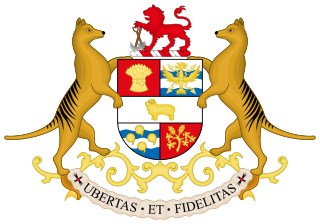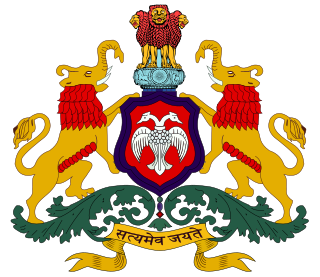Related Research Articles
A member of parliament (MP) is the representative in parliament of the people who live in their electoral district. In many countries with bicameral parliaments, this term refers only to members of the lower house since upper house members often have a different title. The terms congressman/congresswoman or deputy are equivalent terms used in other jurisdictions. The term parliamentarian is also sometimes used for members of parliament, but this may also be used to refer to unelected government officials with specific roles in a parliament and other expert advisers on parliamentary procedure such as the Senate parliamentarian in the United States. The term is also used to the characteristic of performing the duties of a member of a legislature, for example: "The two party leaders often disagreed on issues, but both were excellent parliamentarians and cooperated to get many good things done."

The Legislative Council of the Hong Kong Special Administrative Region (LegCo) is the unicameral legislature of Hong Kong. It sits under China's "one country, two systems" constitutional arrangement, and is the power centre of Hong Kong's hybrid representative democracy, though popular representation in the legislature has diminished significantly in recent years, along with its political diversity.

The Congress of the Philippines is the legislature of the national government of the Philippines. It is bicameral, composed of a lower body, the House of Representatives, although colloquially the term "Congress" commonly refers to just the latter, and an upper body, the Senate. The House of Representatives meets in the Batasang Pambansa in Quezon City while the Senate meets in the GSIS Building in Pasay.

Since becoming independent of the United Kingdom in 1970, Fiji has had four constitutions, and the voting system has changed accordingly.

The House of Assembly, or Lower House, is one of the two chambers of the Parliament of Tasmania in Australia. The other is the Legislative Council or Upper House. It sits in Parliament House in the state capital, Hobart.

Elections in Hong Kong take place when certain political offices in the government need to be filled. Hong Kong has a multi-party system, with numerous parties in the Legislative Council. The Chief Executive of Hong Kong is nonpartisan but has to work with several parties to form a coalition government.

The Parliament of South Australia is the bicameral legislature of the Australian state of South Australia. It consists of the 47-seat House of Assembly and the 22-seat Legislative Council. General elections are held every 4 years, with all of the lower house and half of the upper house filled at each election. It follows a Westminster system of parliamentary government with the executive branch required to both sit in parliament and hold the confidence of the House of Assembly. The parliament is based at Parliament House on North Terrace in the state capital of Adelaide.

Elections in Botswana take place within the framework of a multi-party democracy and a parliamentary system. The National Assembly is mostly directly elected, and in turn elects the President and some of its own members. The Ntlo ya Dikgosi is a mixture of appointed, hereditary and indirectly elected members.
The Senate was the upper house of the Parliament of South Africa between 1910 and its abolition from 1 January 1981, and between 1994 and 1997.

The House of Assembly is the Legislature of Kiribati. Since 2016, it has 45 members, 44 elected for a four-year term in 23 single-seat and multi-seat constituencies and 1 non-elected delegate from the Banaban community on Rabi Island in Fiji. From 1979 to 2016, the Attorney general was an ex officio member of the legislature, until a change of the constitution modified this provision.

The Puducherry Legislative Assembly is the unicameral legislature of the Indian union territory (UT) of Puducherry, which comprises four districts: Puducherry, Karaikal, Mahé and Yanam. Out of eight union territories of India, only three have legislatures and they are Delhi, Puducherry and Jammu and Kashmir. After delimitation shortly after its formation, the Puducherry legislative assembly has 33 seats, of which 5 are reserved for candidates from scheduled castes and 3 members are nominated by the Government of India. 30 out of 33 Members are elected directly by the people on the basis of universal adult franchise and the remaining three are nominated by the central government. These nominated members enjoy same powers as elected members of the assembly.

The Karnataka Legislative Assembly, formerly the Mysore Legislative Assembly or Mysore Representative Assembly, is the lower house of the bicameral legislature of the southern Indian state of Karnataka. Karnataka is one of the six states in India where the state legislature is bicameral, comprising two houses: the Vidhan Sabha and the Vidhan Parishad . There are 224 Members of the Legislative Assembly (MLAs) and are directly elected by people through adult franchise. Karnataka is thus divided into 224 constituencies to elect members to the Assembly, each constituency electing one member. The assembly is elected using the simple plurality or "first past the post" electoral system. The elections are conducted by the Election Commission of India.

General elections were held in Sierra Leone Colony and Protectorate in November 1951.

General elections were held in the Gambia in 1960, following the implementation of a new constitution, which created a House of Representatives. The new legislature had 19 elected seats, twelve seats were elected in the protectorate and seven in the colony. Eight seats were reserved for chiefs. In addition, the Governor-general, the Speaker, the Civil Secretary, the Financial Secretary, the Attorney General and the Commissioner for Local Government and up to three nominated members were also members of the House.

Elections in the state of Bihar, India are conducted in accordance with the Constitution of India. The Assembly of Bihar creates laws regarding the conduct of local body elections unilaterally while any changes by the state legislature to the conduct of state level elections need to be approved by the Parliament of India.
The Uganda Legislative Council (LEGCO) was the predecessor of the Parliament of Uganda, prior to Uganda's independence from the United Kingdom. LEGCO was small to start with and all its members were Europeans. Its legislative powers were limited, since all important decisions came from the British Government in Whitehall.

The Gambia Colony and Protectorate was the British colonial administration of The Gambia from 1821 to 1965, part of the British Empire in the New Imperialism era. The colony was the immediate area surrounding Bathurst, and the protectorate was the inland territory situated around the Gambia River, which was declared in 1894.
Legislative elections were held in Macau on 15 September 2013 according to the provisions of the Basic Law of Macau. This election was the first of its kind succeeding the reform of the Legislative Assembly that created four new seats; two new geographical constituency seats and two new functional constituency seats. Out of a total of 33 seats, 14 were elected by universal suffrage under the highest averages method, while 12 were voted on from the Functional constituency, and 7 from nomination by the Chief Executive.

General elections were held in Nigeria in 1947. The Nigerian National Democratic Party (NNDP) won three of the four elected seats in the Legislative Council.

The Legislative Council of Kenya (LegCo) was the legislature of Kenya between 1907 and 1963. It was modelled on the Westminster system. It began as a nominated, exclusively European institution and evolved into an elected legislature with universal suffrage. It was succeeded by the National Assembly in 1963.
References
- 1 2 3 Hughes, Arnold; Perfect, David (2008). Historical Dictionary of the Gambia . Lanham, Maryland: Scarecrow Press. pp. 95–96. ISBN 9780810858251.
- ↑ "Gambia (1965-present)". University of Central Arkansas. Retrieved 25 June 2017.